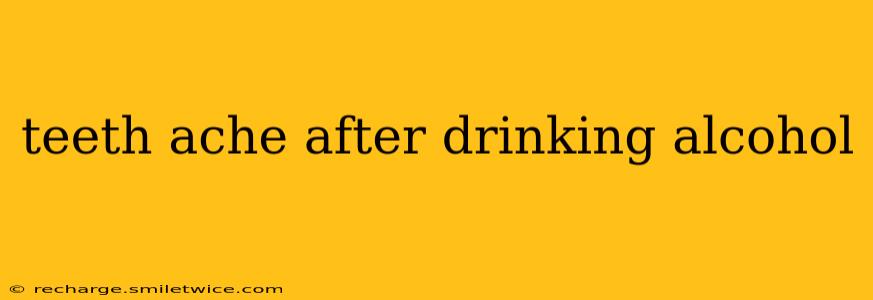Many people experience a toothache after consuming alcohol, a surprisingly common problem with various potential causes. This isn't simply a matter of sensitive teeth; the connection between alcohol and dental pain is more complex than you might think. This comprehensive guide explores the reasons why your teeth might ache after drinking alcohol, offering insights and solutions to help you manage this uncomfortable issue.
Why Do My Teeth Hurt After Drinking Alcohol?
The relationship between alcohol consumption and toothaches isn't always direct. It's often the consequence of existing dental problems exacerbated by alcohol's effects. Let's explore some key reasons:
1. Alcohol's Acidity:
Many alcoholic beverages are acidic. This acidity can erode tooth enamel, exposing the sensitive dentin layer underneath. Existing cavities or weakened enamel are particularly vulnerable. The longer the alcohol remains in contact with your teeth, the greater the potential for damage and subsequent pain. This is especially true for drinks like wine, which often have higher acidity levels than beer or spirits.
2. Dehydration:
Alcohol is a diuretic, meaning it increases urination and can lead to dehydration. Saliva plays a crucial role in neutralizing acids in the mouth and protecting teeth. Dehydration reduces saliva production, leaving your teeth more susceptible to acid erosion and increased sensitivity.
3. Existing Dental Problems:
Alcohol consumption rarely causes a toothache directly, but it can significantly worsen pre-existing conditions. If you have cavities, gum disease (gingivitis or periodontitis), cracked teeth, or exposed tooth roots, alcohol can irritate these areas, leading to increased pain and discomfort. The acidic nature of alcoholic beverages can aggravate these problems, making the pain more intense.
4. Alcohol's Effect on Blood Vessels:
Some research suggests alcohol can affect blood vessels, potentially influencing the nerves and tissues surrounding your teeth. While not fully understood, this effect could contribute to increased sensitivity and pain after consumption.
5. Certain Additives and Ingredients:
Some alcoholic drinks contain added sugars, artificial sweeteners, or other ingredients that can contribute to dental problems. These ingredients can feed bacteria in your mouth, leading to acid production and increased risk of cavities and gum disease.
What to Do If Your Teeth Ache After Drinking Alcohol?
Managing the pain and preventing future occurrences requires a multi-pronged approach:
1. Rinse Your Mouth:
After consuming alcohol, rinse your mouth thoroughly with water or a fluoride mouthwash. This helps remove residual alcohol and acids, minimizing their contact with your teeth.
2. Stay Hydrated:
Drink plenty of water to counteract the dehydrating effects of alcohol and restore saliva production, which helps protect your teeth.
3. Pain Relief:
Over-the-counter pain relievers like ibuprofen or acetaminophen can help alleviate toothache pain. However, consult your dentist or doctor if the pain is severe or persistent.
4. See Your Dentist Regularly:
Regular dental check-ups and cleanings are crucial for maintaining good oral health and preventing problems that might be exacerbated by alcohol consumption. Early detection and treatment of cavities, gum disease, and other dental issues are essential.
5. Limit Alcohol Consumption:
Moderating alcohol intake significantly reduces your risk of experiencing alcohol-related toothaches. Consciously reducing your alcohol consumption can have a positive impact on your overall health, including your oral health.
Frequently Asked Questions (FAQ)
Can alcohol cause tooth decay?
While alcohol doesn't directly cause tooth decay, its acidic nature and potential for dehydration can contribute to enamel erosion, making teeth more vulnerable to decay. The sugars in some alcoholic beverages further exacerbate this risk.
Why does my tooth hurt more after drinking wine?
Wine, especially red wine, is often highly acidic. This high acidity can directly erode tooth enamel and irritate sensitive teeth, leading to more intense pain than other alcoholic beverages.
Is it a sign of a serious problem if my teeth hurt after drinking?
While a temporary toothache after drinking might not be serious, persistent or severe pain warrants a visit to your dentist. It could indicate an underlying dental problem requiring professional attention.
How can I prevent toothaches from alcohol?
Maintaining good oral hygiene (brushing and flossing), limiting alcohol consumption, rinsing your mouth after drinking, and staying hydrated are all effective preventative measures. Regular dental check-ups are also crucial.
By understanding the causes and taking proactive steps, you can significantly reduce the likelihood of experiencing a toothache after enjoying alcoholic beverages. Remember, maintaining good oral hygiene practices and regular dental visits are key to preventing and managing dental problems.
